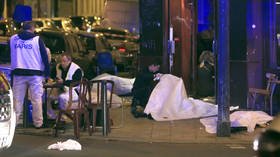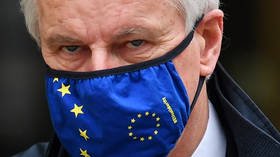Five years after Bataclan slaughter in Paris, France has done little to combat Islamist terrorism. More atrocities are inevitable

After a string of attacks by Islamist killers in recent weeks, France is no closer to solving its terrorism problem than it was in 2015, when Paris endured a night of horror. No one will be surprised when the next outrage happens.
Five years ago tonight, terror stalked the streets of Paris. When it left, 130 people had been slaughtered, 350 injured, and countless others left haunted forever after having their feet soaked with the blood of the dead as they fled a team of ruthless Islamist killers.
Tonight, as it recalls those nightmarish events, the entire French nation remains in lockdown thanks to the coronavirus pandemic. But with a slew of recent killings of the most abominable kind, many people believe that home behind locked doors is the safest place to be.
It would be a relief to think that a night like November 13, 2015, could never happen again – but that would simply be naive.
Covid-19 has taken its toll among the French population, but there will eventually be a vaccine for that, maybe even sooner rather than later. It’s the evil ideology of the Islamist terrorists, some radicalised right under French noses, that is proving a more stubborn virus with which to contend.
Also on rt.com As bodies mount up in terrorist attacks, Europe must realise Islam itself is not the problem but how & why people get radicalisedThe situation has not improved since 2015. In fact, it has become worse, and France remains public enemy number one for terrorists.
Some believe the tough talk from President Emmanuel Macron is not exactly helpful in taking the heat out of the situation. But his predecessor, Francois Hollande, who was president back in 2015 at the time of the November assaults, was equally as strident in his condemnation of the attacks and the need for robust measures to prevent further incidents.
Since then, however, apart from the watchlists, deportations, and imprisonment of suspected Islamists, France has done little to improve life for young, disenchanted Muslims in the banlieues of the country’s big cities. There, youth unemployment, crime, drugs, and a cultural impasse between the religious imperatives of the migrant communities and the secular state continue to enhance feelings of disassociation.
Of course, not all extremists are homegrown. The freedom of movement afforded European Union citizens, trumpeted by the EU as a cornerstone of membership of the bloc, is also proving problematic. Porous borders within the Schengen area make it easy for terrorists to come and go as they please without detection or any sort of joined-up monitoring from the various intelligence and security forces.
The recent attack at the Notre Dame de l’Assomption basilica in Nice, in which one of the three victims was decapitated, was undertaken by Brahim Aouissaoui, a Tunisian migrant who had crossed the Mediterranean to Italy then travelled to France unaccosted by the authorities, like a carefree holidaymaker. It was all just too easy.
Also on rt.com France has paid an appalling price for its lax attitude to radical Islam and a clampdown on extremists is long overdueAs was the attack in Nice in July 2016, when fellow Tunisian Mohamed Lahouaiej-Bouhlel drove a 19-tonne rental truck into the crowds celebrating Bastille Day along the Promenade des Anglais, killing 86 people and injuring 458 others.
Although a ban on large trucks entering the area had been in place at the time, the murderer had driven his lorry repeatedly up and down the promenade, even pausing to take selfies without being stopped or questioned. Again, it all seemed just too easy.
And this unfolded after the Paris attacks which had taken place the previous November. For people caught up in the mayhem at the Stade de France, where the national team was playing Germany in a football friendly, the fans dancing at an Eagles of Death Metal gig at the Bataclan theatre and those enjoying a drink outside the Carillon and Bonne Biere bars, or a meal at La Belle Equipe, November 13 – even if it’s not a Friday – will forever remain a night of true horror, but nothing to do with the cartoonish Freddy Krueger or axe-wielding, hockey mask-wearing Jason Voorhees.
No, the names that will feature in the retelling of Paris’s nightmare will include monsters like Abdelhamid Abaaoud and the murderous brothers Salah and Brahim Abdeslam, the latter dying outside the Comptoir Voltaire cafe where, having taken a seat and placed an order with the waiter, he promptly detonated his suicide vest, killing himself and injuring 15 others.
Also on rt.com France’s all-powerful state is as powerless against violent Islamism as it is against the coronavirusWhat is really terrifying is that, outside of lockdown, this could quite easily happen again, and no one would be that surprised. While after any attack various terrorist organisations could be relied upon to claim responsibility, the reality now seems to be that most of the violence is organised by small cells of loosely affiliated Islamists, having met in prison, local radical mosques, or the deprived neighbourhoods of French cities.
The French security services are believed to have 20,000 people currently on their extremist watchlist and any of those names could suddenly hit the headlines for all the wrong reasons, having wrought murderous havoc upon an unsuspecting public, seemingly out of the blue.
Unless France finds a way to heal its deepening cultural rifts and make its Muslim population feel a part of society, rather than unwanted fringe dwellers, then it’s hard to see a happy ending to this apparently insurmountable problem.
Until a solution is found, Islamist terrorism in l’Hexagone will remain an ongoing horror story, and not just one for Friday the 13th.
Think your friends would be interested? Share this story!
The statements, views and opinions expressed in this column are solely those of the author and do not necessarily represent those of RT.















